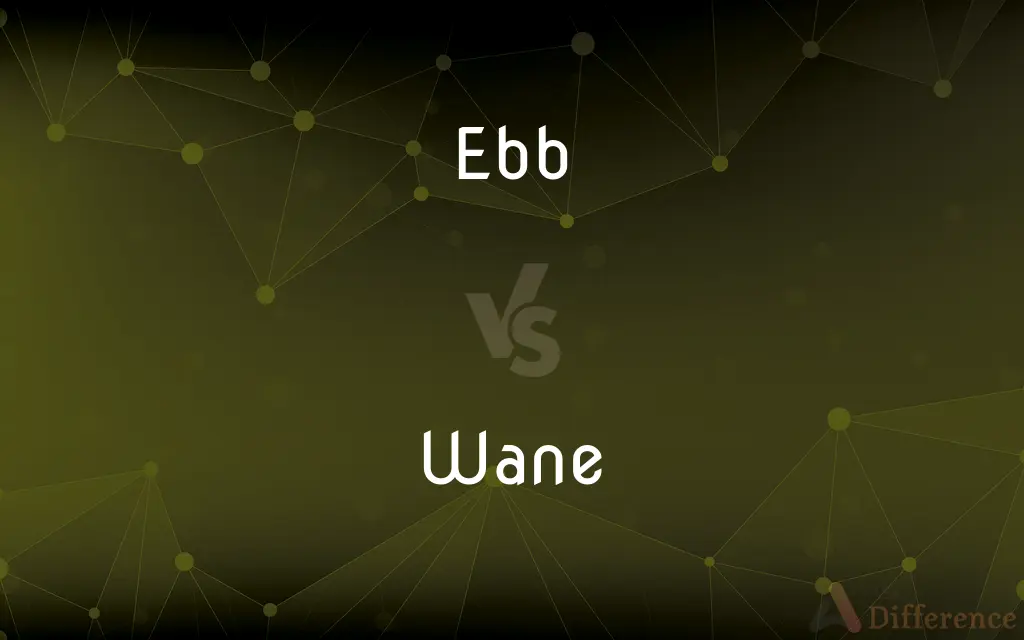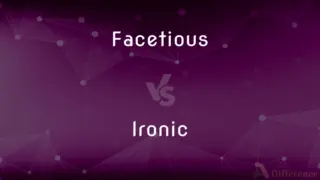Ebb vs. Wane — What's the Difference?
Edited by Tayyaba Rehman — By Maham Liaqat — Updated on April 8, 2024
Ebbing refers to the receding movement of water, particularly during a tide, while waning denotes a decrease in size, brightness, or strength, often used in reference to the moon.

Difference Between Ebb and Wane
Table of Contents
ADVERTISEMENT
Key Differences
Ebbing and waning are terms that describe processes of decrease or decline, but in different contexts. Ebb specifically pertains to the movement of water, notably the sea, as it moves away from the land in a tidal process, while wane generally refers to a reduction in size, brightness, or strength, and is most commonly used in the context of the moon's phases.
While ebb is used to describe a physical movement in a specific natural phenomenon (the tide), wane is more broadly applicable, describing any gradual decrease. For instance, ebb captures the sea's retreat from the shore, whereas wane could describe the moon's diminishing visibility or the fading of an emotion.
The concept of ebbing, rooted in the natural world, conveys a cyclic and predictable movement tied to the gravitational effects of the moon and sun on the Earth's waters. On the other hand, waning, though often used to describe the lunar cycle, can apply to various scenarios, including the decline of emotions, fortunes, or physical objects.
Culturally, both terms have been metaphorically extended beyond their original meanings. Ebb is frequently used to depict a decline in fortunes or emotions, akin to the sea's retreat, while wane can symbolize the fading of power, interest, or affection, reflecting the gradual diminution seen in the moon's phases.
Despite their differences, both terms imply a process of decrease or fading, each with its specific context and usage. Ebb relates directly to the physical realm of water tides, while wane serves a broader metaphorical purpose, capturing declines across a range of phenomena from the celestial to the personal.
ADVERTISEMENT
Comparison Chart
Definition
The movement of tide waters away from the land
The decrease in size, brightness, or strength
Context
Specifically related to water and tides
Broadly used, often in reference to the moon
Physical vs. Metaphorical
Primarily physical with some metaphorical uses
Both physical and metaphorical, with broader applications
Predictability
Cyclic and predictable due to gravitational forces
Can be cyclic (moon) or variable (emotions, interest)
Usage in Language
Used to describe natural phenomena and metaphorically for declines
Used for celestial phenomena, emotional states, and more
Compare with Definitions
Ebb
Used metaphorically to describe fading emotions or fortunes.
Her fear ebbed away as she understood the situation better.
Wane
Symbolizes decline or reduction in various contexts.
The aging athlete's prowess began to wane.
Ebb
Reflects cyclic natural processes tied to lunar and solar gravitational effects.
The coastal town's economy ebbed and flowed with the seasonal tides.
Wane
Can apply to fading emotions, interests, or physical states.
Her interest in the hobby waned over the years.
Ebb
A decline or decrease in condition or strength.
As the evening wore on, the party's enthusiasm began to ebb.
Wane
The process of decreasing in size, brightness, or strength.
As the moon wanes, the nights grow darker.
Ebb
Often used in literature to symbolize withdrawal or retreat.
In the novel, the empire's power ebbed as the rebellion grew stronger.
Wane
Often used to describe the diminishing phase of the moon.
The waning gibbous moon hung low in the night sky.
Ebb
The outward movement of tide waters away from the shore.
The fishermen returned their boats to the harbor as the tide began to ebb.
Wane
Metaphorically represents the fading of power or affection.
The dictator's influence on the populace slowly waned.
Ebb
The receding or outgoing tide, occurring between the time when the tide is highest and the time when the following tide is lowest. Also called ebb tide, falling tide.
Wane
(of the moon) have a progressively smaller part of its visible surface illuminated, so that it appears to decrease in size.
Ebb
A period of decline or diminution
"Insistence upon rules of conduct marks the ebb of religious fervor" (Alfred North Whitehead).
Wane
(of a state or feeling) decrease in vigour or extent; become weaker
Confidence in the dollar waned
Ebb
To fall back from the flood stage.
Wane
The amount by which a plank or log is bevelled or falls short of a squared shape
I cut the log into slabs without removing the outside wane
Ebb
To fall away or back; decline or recede. See Synonyms at recede1.
Wane
To decrease gradually in size, number, strength, or intensity
Interest in the subject waned.
Ebb
The receding movement of the tide.
The boats will go out on the ebb.
Wane
To show a progressively smaller illuminated area, as the moon does in passing from full to new.
Ebb
A gradual decline.
Wane
To approach an end
The day began to wane.
Ebb
(especially in the phrase 'at a low ebb') A low state; a state of depression.
Wane
The act or process of gradually declining or diminishing.
Ebb
A European bunting, the corn bunting (Emberiza calandra, syns. Emberiza miliaria, Milaria calandra).
Wane
A time or phase of gradual decrease.
Ebb
(intransitive) to flow back or recede
The tides ebbed at noon.
Wane
The period of the decrease of the moon's illuminated visible surface.
Ebb
(intransitive) to fall away or decline
The dying man's strength ebbed away.
Wane
A defective edge of a board caused by remaining bark or a beveled end.
Ebb
(intransitive) to fish with stakes and nets that serve to prevent the fish from getting back into the sea with the ebb
Wane
A gradual diminution in power, value, intensity etc.
Ebb
(transitive) To cause to flow back.
Wane
The lunar phase during which the sun seems to illuminate less of the moon as its sunlit area becomes progressively smaller as visible from Earth.
Ebb
Low, shallow
Wane
(literary) The end of a period.
Ebb
The European bunting.
Wane
(woodworking) A rounded corner caused by lack of wood, often showing bark.
Ebb
The reflux or flowing back of the tide; the return of the tidal wave toward the sea; - opposed to flood; as, the boats will go out on the ebb.
Thou shoreless flood which in thy ebb and flowClaspest the limits of morality!
Wane
A child.
Ebb
The state or time of passing away; a falling from a better to a worse state; low state or condition; decline; decay.
Painting was then at its lowest ebb.
This alternation between unhealthy activity and depression, this ebb and flow of the industrial.
Wane
A house or dwelling.
Ebb
To flow back; to return, as the water of a tide toward the ocean; - opposed to flow.
That Power who bids the ocean ebb and flow.
Wane
(intransitive) To progressively lose its splendor, value, ardor, power, intensity etc.; to decline.
Ebb
To return or fall back from a better to a worse state; to decline; to decay; to recede.
The hours of life ebb fast.
Wane
(intransitive) Said of light that dims or diminishes in strength.
Ebb
To cause to flow back.
Wane
Said of the Moon as it passes through the phases of its monthly cycle where its surface is less and less visible.
Ebb
Receding; going out; falling; shallow; low.
The water there is otherwise very low and ebb.
Wane
(intransitive) Said of a time period that comes to an end.
Ebb
A gradual decline (in size or strength or power or number)
Wane
To decrease physically in size, amount, numbers or surface.
Ebb
The outward flow of the tide
Wane
To cause to decrease.
Ebb
Flow back or recede;
The tides ebbed at noon
Wane
To be diminished; to decrease; - contrasted with wax, and especially applied to the illuminated part of the moon.
Like the moon, aye wax ye and wane.Waning moons their settled periods keep.
Ebb
Hem in fish with stakes and nets so as to prevent them from going back into the sea with the ebb
Wane
To decline; to fail; to sink.
You saw but sorrow in its waning form.
Land and trade ever will wax and wane together.
Ebb
Fall away or decline;
The patient's strength ebbed away
Wane
To cause to decrease.
Wane
The decrease of the illuminated part of the moon to the eye of a spectator.
Wane
Decline; failure; diminution; decrease; declension.
An age in which the church is in its wane.
Though the year be on the wane.
Wane
An inequality in a board.
Wane
The natural curvature of a log or of the edge of a board sawed from a log.
Wane
A gradual decline (in size or strength or power or number)
Wane
Grow smaller;
Interest in the project waned
Wane
Become smaller;
Interest in his novels waned
Wane
Decrease in phase;
The moon is waning
Common Curiosities
What is the significance of the ebbing tide in literature?
In literature, the ebbing tide often symbolizes loss, retreat, or decline in fortune or emotion.
What does it mean for the tide to ebb?
When the tide ebbs, it means the sea's water is moving away from the land, marking a retreat of the tide.
How is waning moon different from a new moon?
A waning moon is in the process of decreasing visibility towards a new moon, where it is completely invisible from Earth.
How do the phases of the moon affect its waning?
The phases of the moon are determined by its orbit around Earth, with the waning phase occurring as it moves from full moon towards new moon.
What does a waning interest in a hobby look like?
A waning interest in a hobby typically manifests as reduced engagement, time spent, or enjoyment in the activity.
Can emotions ebb?
Yes, emotions can ebb metaphorically, meaning they decrease in intensity or fade away.
Is waning used only for the moon?
While commonly associated with the moon, waning can describe any decrease in size, brightness, or strength.
What causes the tide to ebb?
The ebbing tide is caused by the gravitational pull of the moon and sun on the Earth’s waters.
Can the popularity of a trend wane?
Yes, the popularity of a trend can wane, indicating it is becoming less widespread or accepted.
Can the strength of a material wane over time?
Yes, the strength of a material can wane over time due to factors like wear, age, or environmental conditions.
Can a person's interest wane?
Yes, a person's interest in something can wane, meaning it gradually diminishes over time.
Can a person’s energy wane?
Yes, a person’s energy can wane, often due to fatigue, disinterest, or health issues, leading to decreased activity or enthusiasm.
Is there a physical reason for emotions to ebb?
While the metaphorical use of ebb for emotions isn’t based on physical causes, it captures the natural flow and retreat of emotional states.
What literary themes are associated with waning?
Waning is often used in literature to explore themes of decline, the passage of time, and the natural cycles of life and nature.
Is the ebb and flow of the tide predictable?
Yes, the ebb and flow of the tide are predictable, based on lunar cycles and geographical factors.
Share Your Discovery

Previous Comparison
Facetious vs. Ironic
Next Comparison
Android vs. SmartphoneAuthor Spotlight
Written by
Maham LiaqatEdited by
Tayyaba RehmanTayyaba Rehman is a distinguished writer, currently serving as a primary contributor to askdifference.com. As a researcher in semantics and etymology, Tayyaba's passion for the complexity of languages and their distinctions has found a perfect home on the platform. Tayyaba delves into the intricacies of language, distinguishing between commonly confused words and phrases, thereby providing clarity for readers worldwide.













































